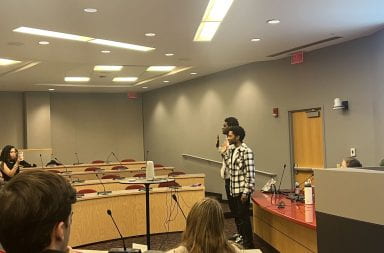Hardcore gamers might defend the merits of beating the final boss in their favorite video game. Others might call it a waste of time. Jane McGonigal, though, sees the potential to change the world.
McGonigal, who will be at Mershon Auditorium tonight as part of the First-Year Distinguished Speaker Series, is a world-renowned video game developer who takes gaming just as seriously as the students who find time to play games between — and sometimes during — class.
She is the director of game resource and development at the Institute for the Future, a nonprofit forecasting firm that creates games that turn real-world problems into online puzzles.
Her organization developed “Superstruct,” a multiplayer game in which players organize society to solve issues the world might have in 2019. McGonigal was also behind “World Without Oil,” a simulation of a global oil crisis that aimed to prod players to change their energy habits.
“We want to learn from gamers what the future might be like,” McGonigal said. “So we often use blogs, videos, photos and social networks to create an immersive picture of the future, each bit of the future, a story told by a different person.”
The online games are open to gamers for a set number of weeks, each week highlighting a new challenge or mission.
“No one knows more about your future than you do, what you would do, what you hope for, what you are capable of making a reality,” McGonigal said. “Our games are designed to empower individual gamers to add that expertise to a big, global view of the world we want to make five or 10 years from now.”
McGonigal said there are 500 million people in the world who play video games, and the average gamer spends 10 hours a week playing.
“If half the gamers in the world spend one hour a week on a game that connects to real-world issues, that would be 250 million hours a week,” McGonigal said. “That means gamers could collaborate on projects the scale of two-and-a-half Wikipedias every single week.”
Researchers at New York University and IBM said it took roughly 100 million hours of work to build what Wikipedia is today.
McGonigal said video games bring out the best in people, giving them the chance to tackle complex problems. She will be sharing more of her findings on campus tonight.
First Year Experience has hosted its speaker series since 2003.
“I think it’s important for students to hear that you can take things that are fun, like playing games, and use them to address real problems in the world,” said Julie Schultz, assistant director of Enrollment Services and First Year Experience.
The event has sparked interest in some first-years who might otherwise have spent the time playing video games in residence halls.
“I think the situation in the game would have to be a perfect scenario to actually make some change,” said Jason Bir, a first-year in biology, at the Gateway Gamestop store. “But I plan to go because I would be interested in current concepts that she is working on.”
The event begins at 7:30 p.m. Free tickets are available at 120 Enarson Hall.


